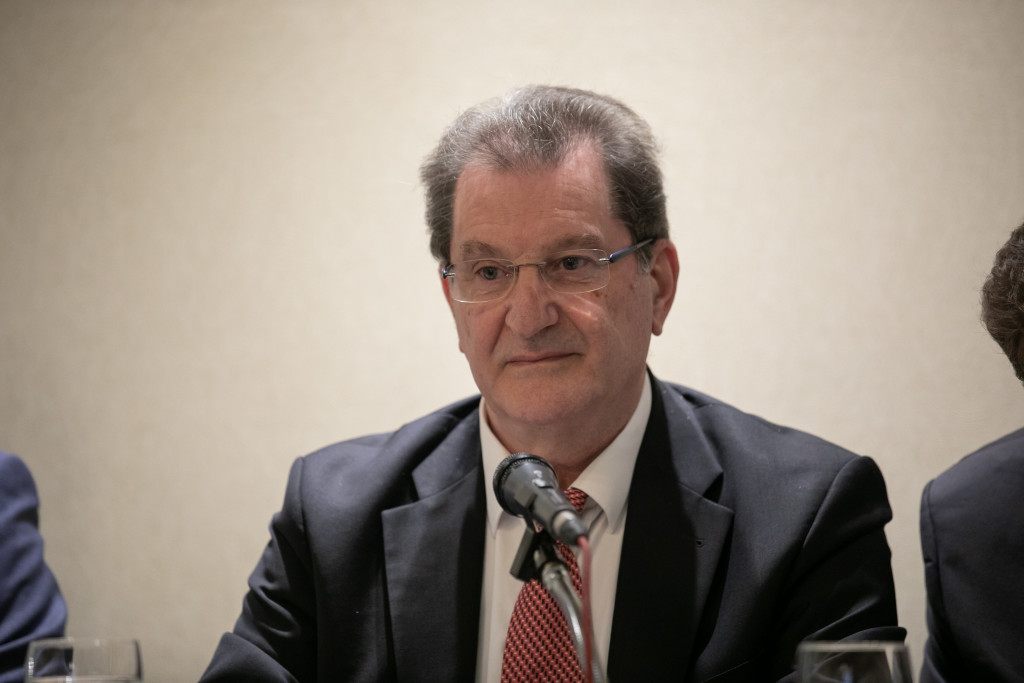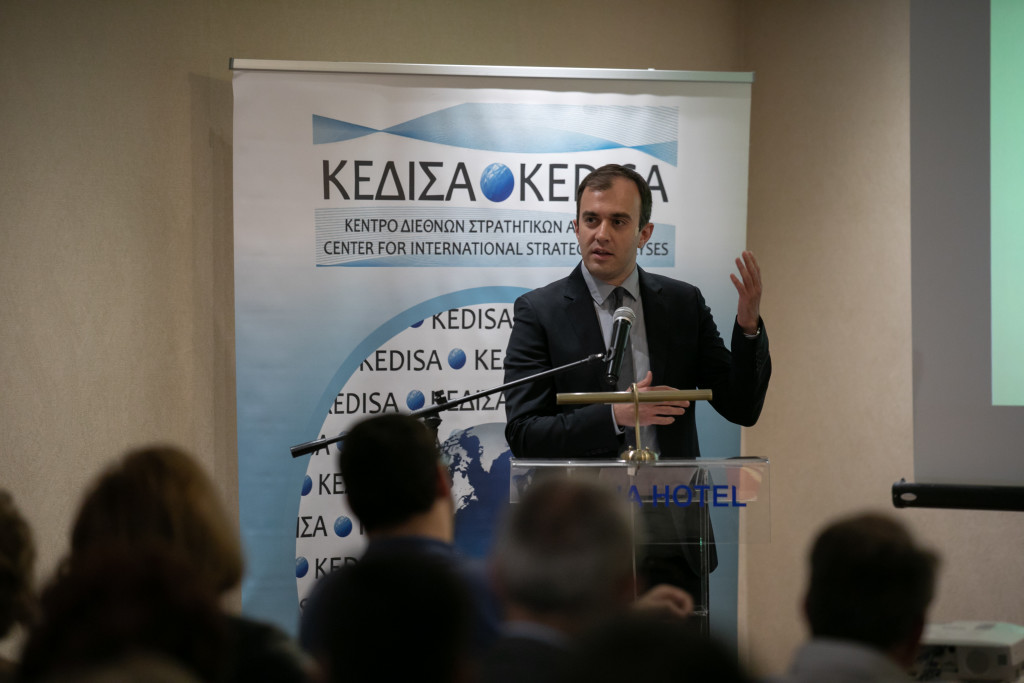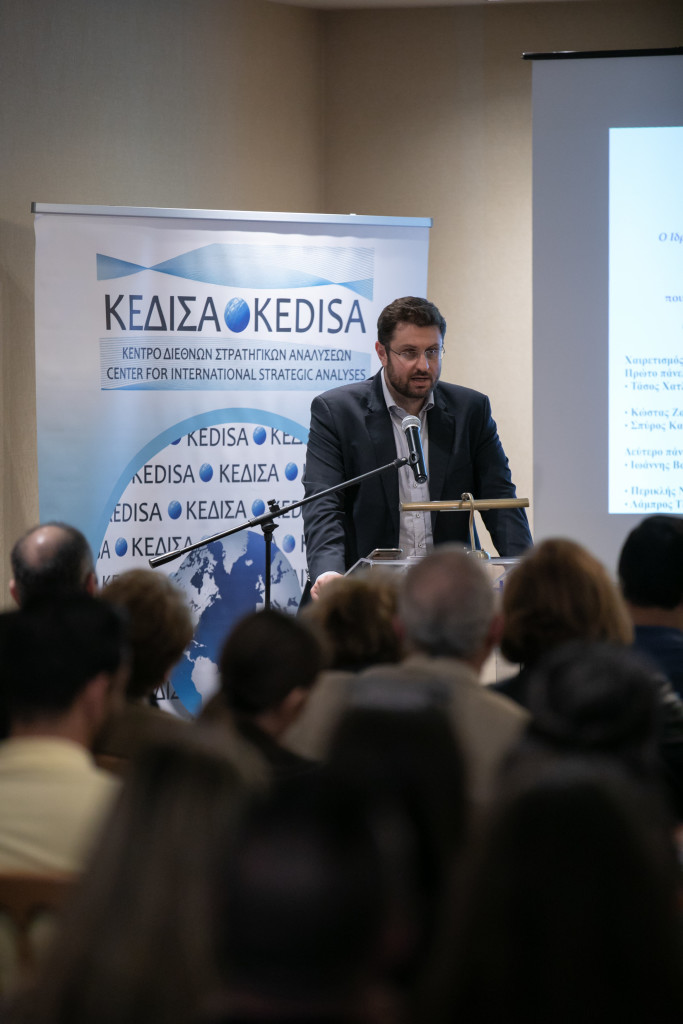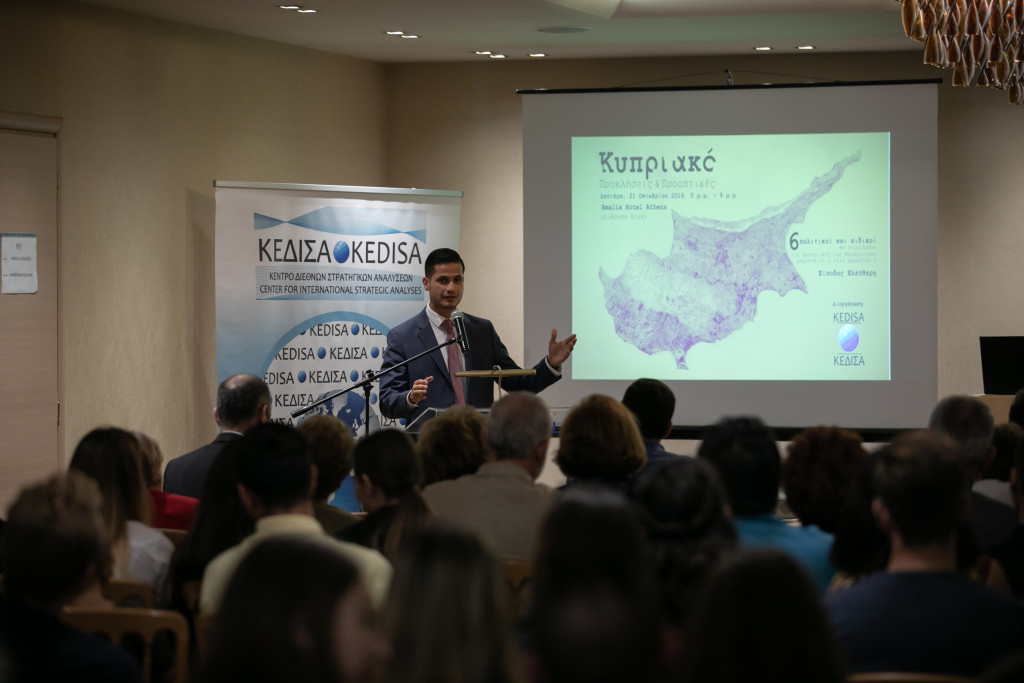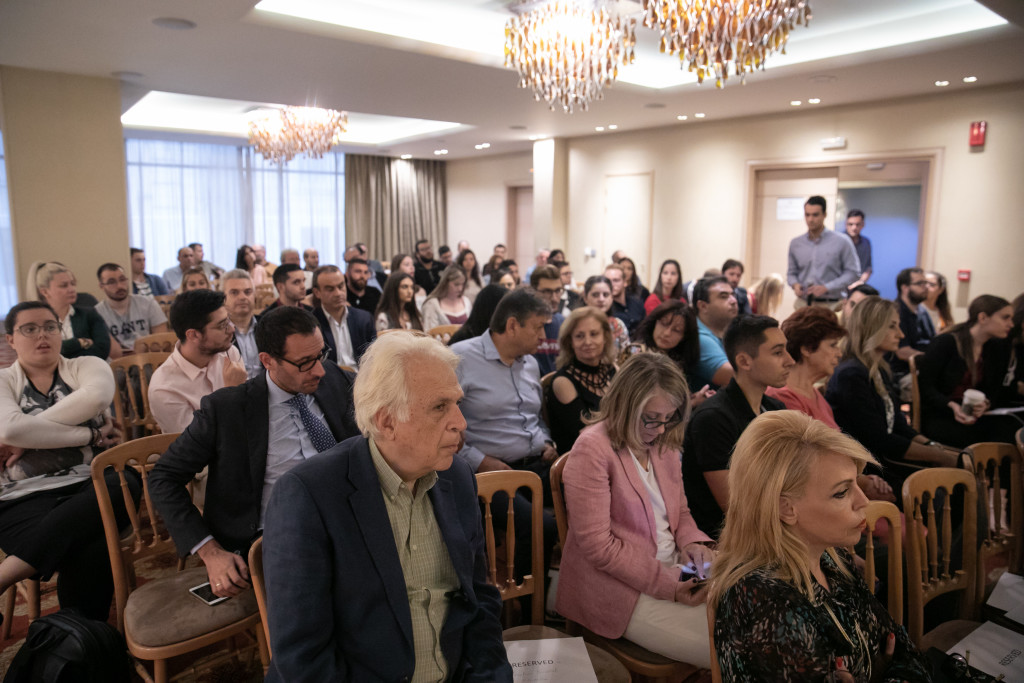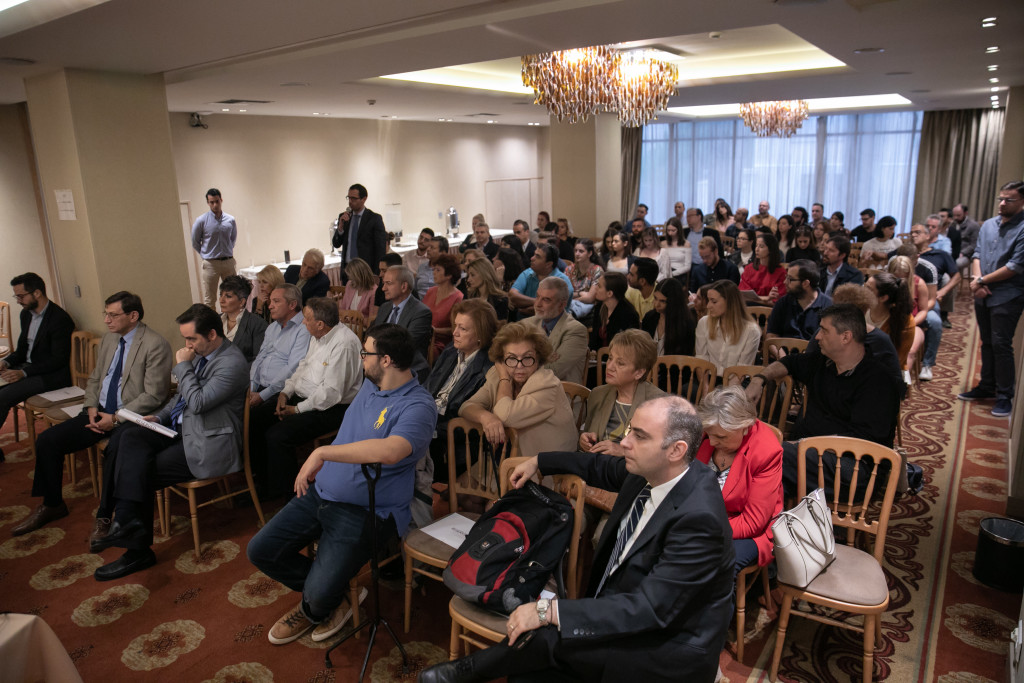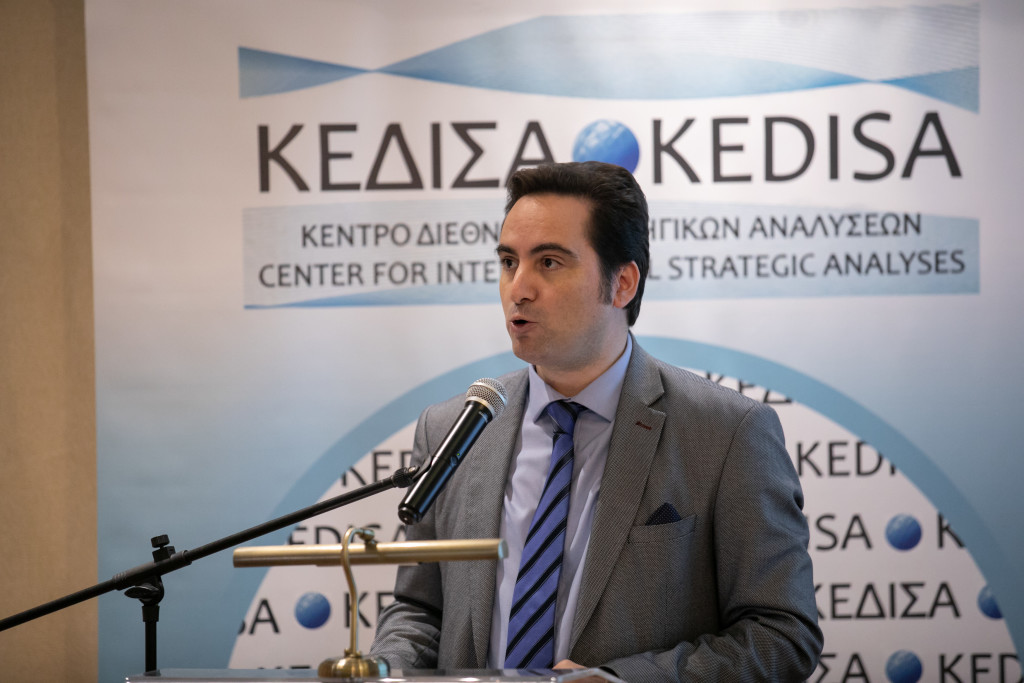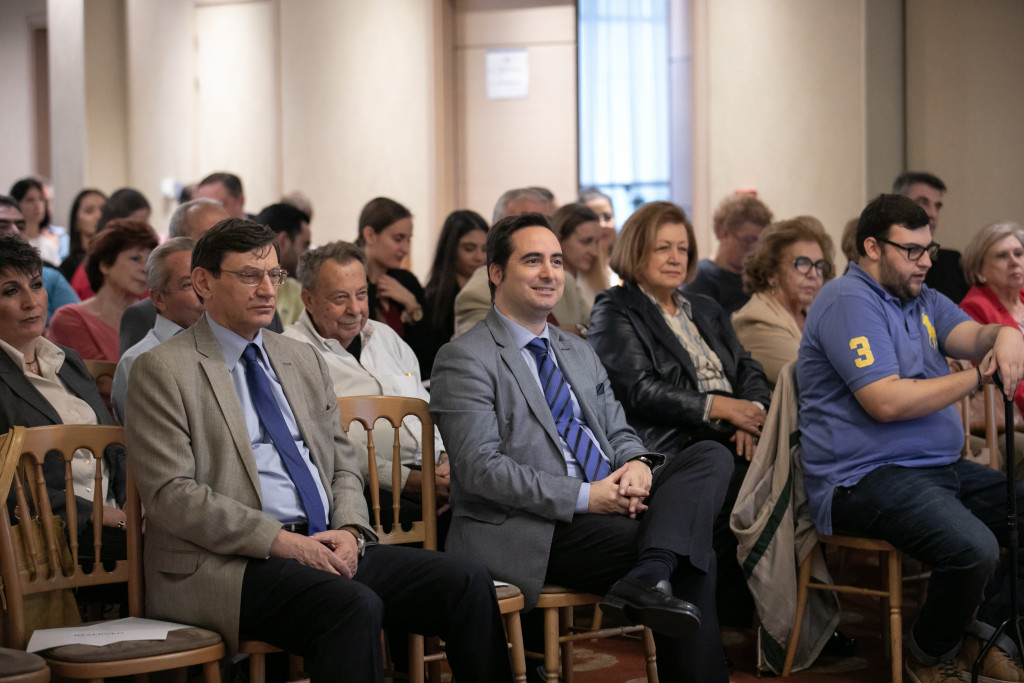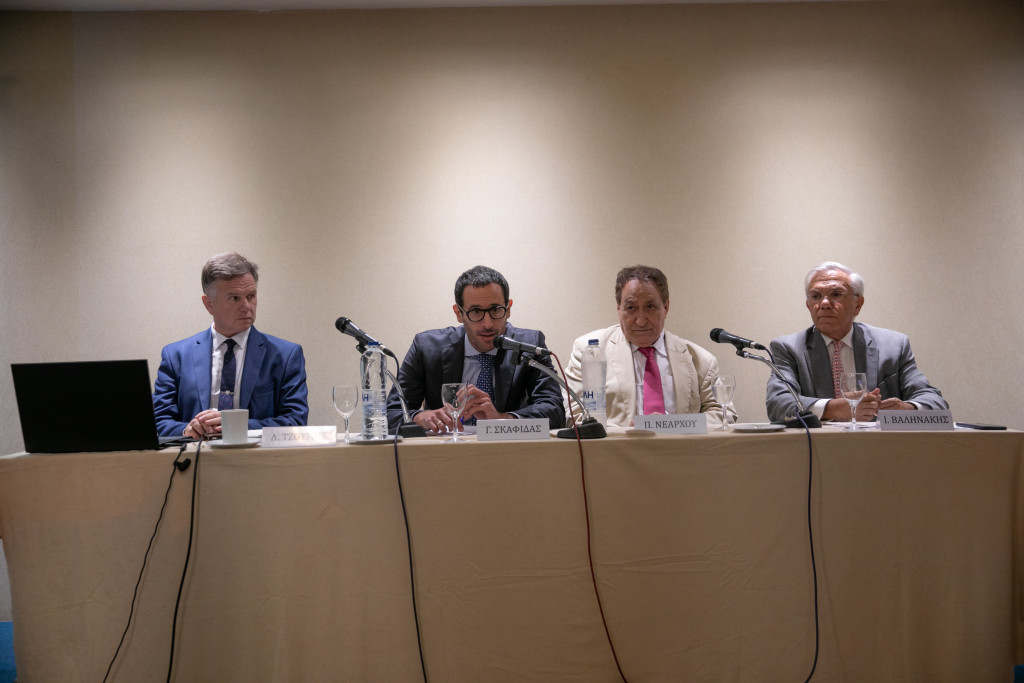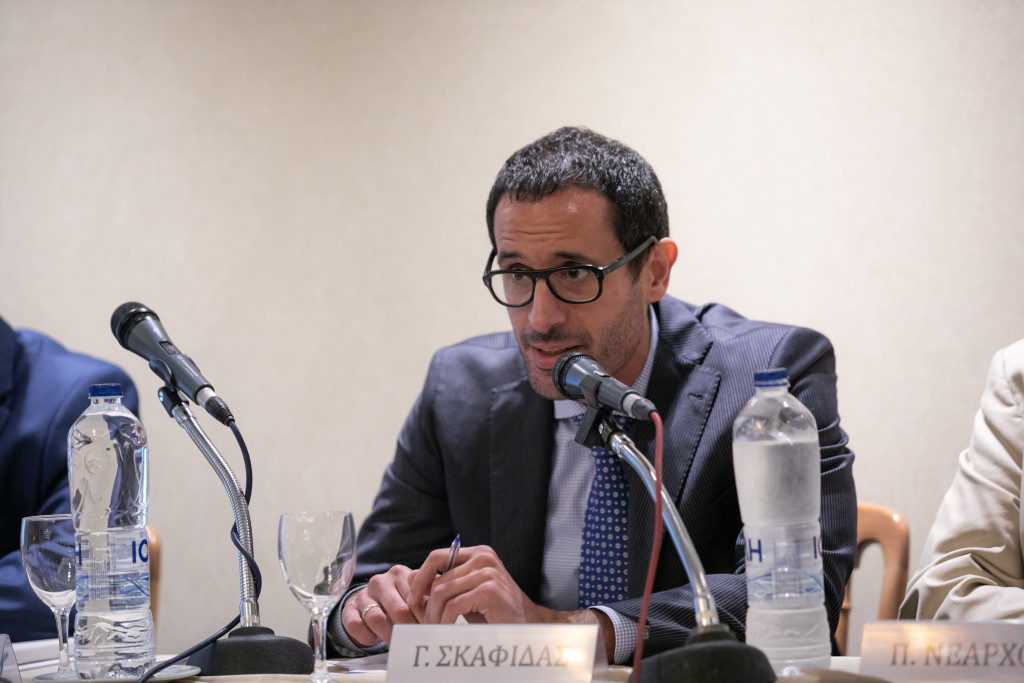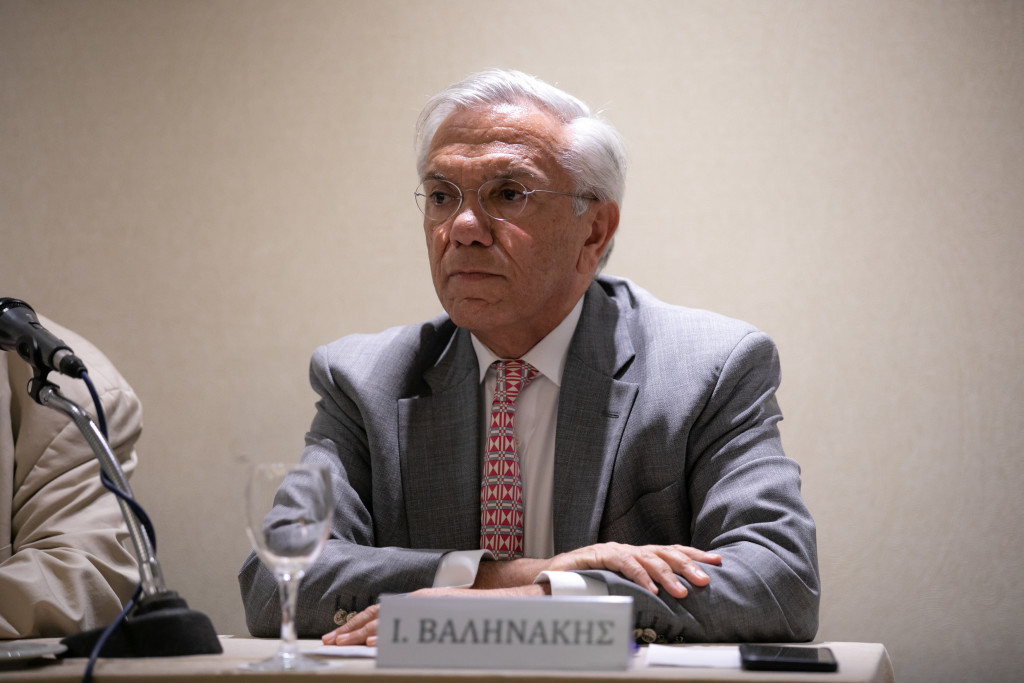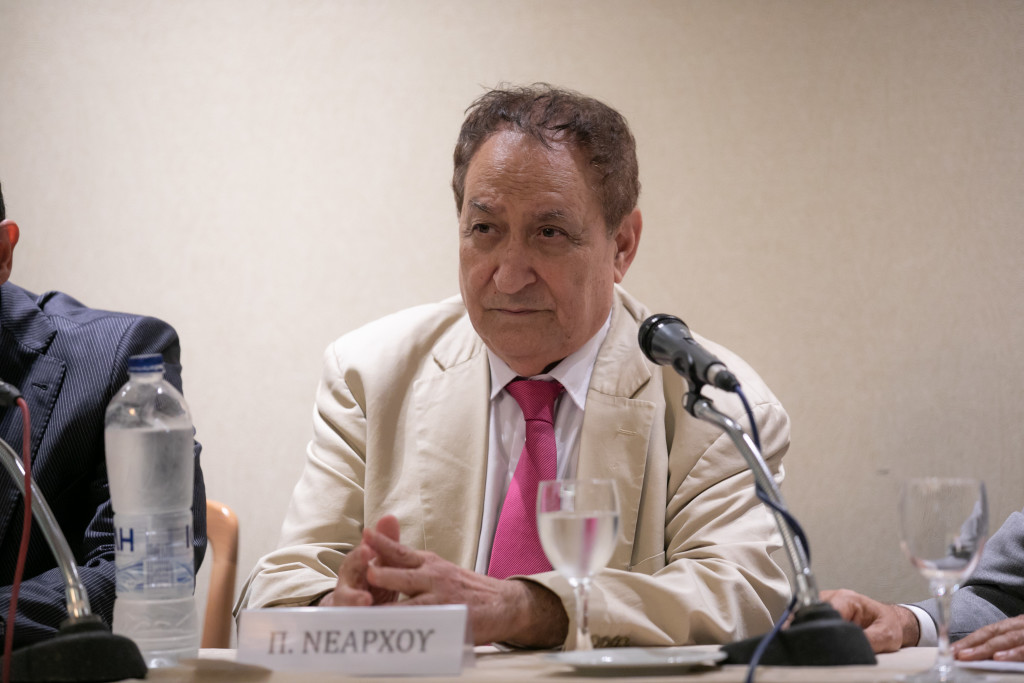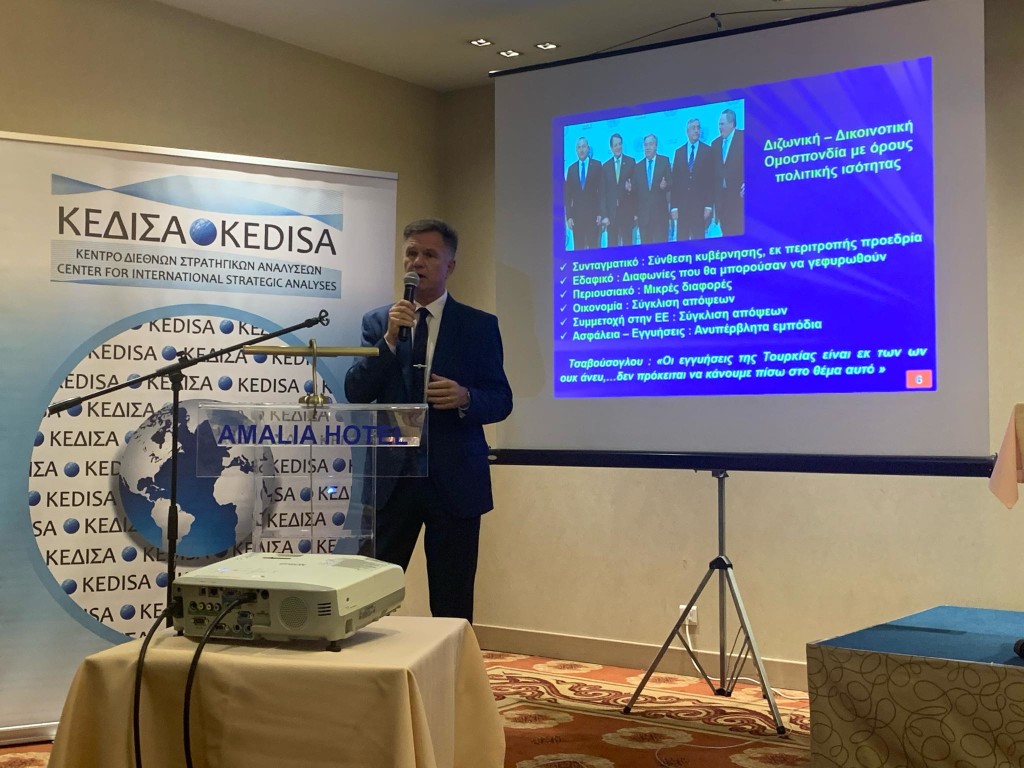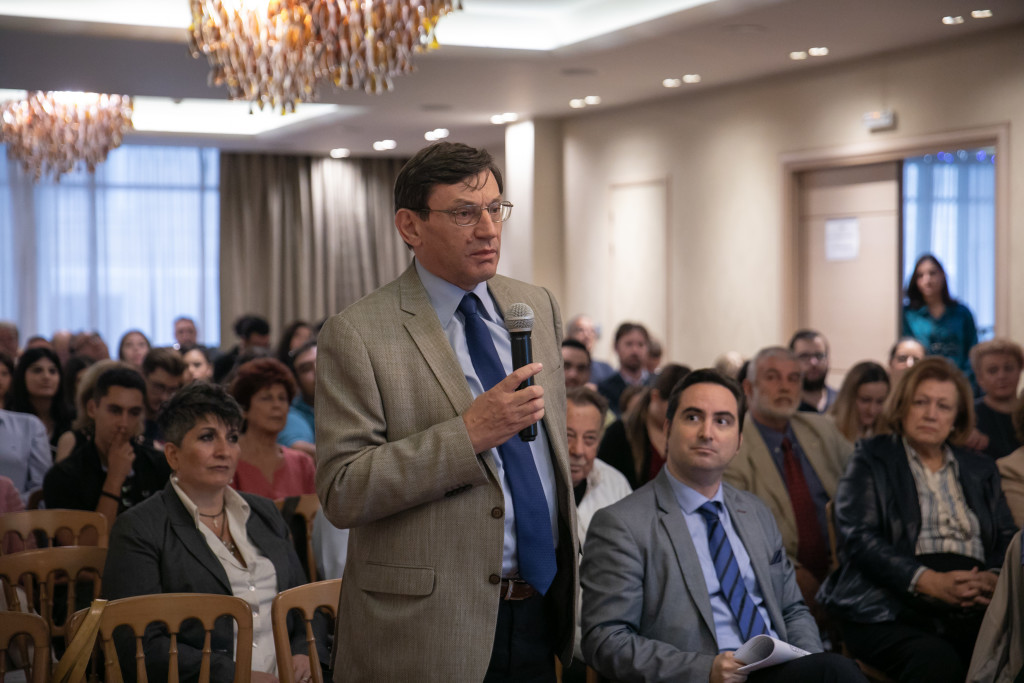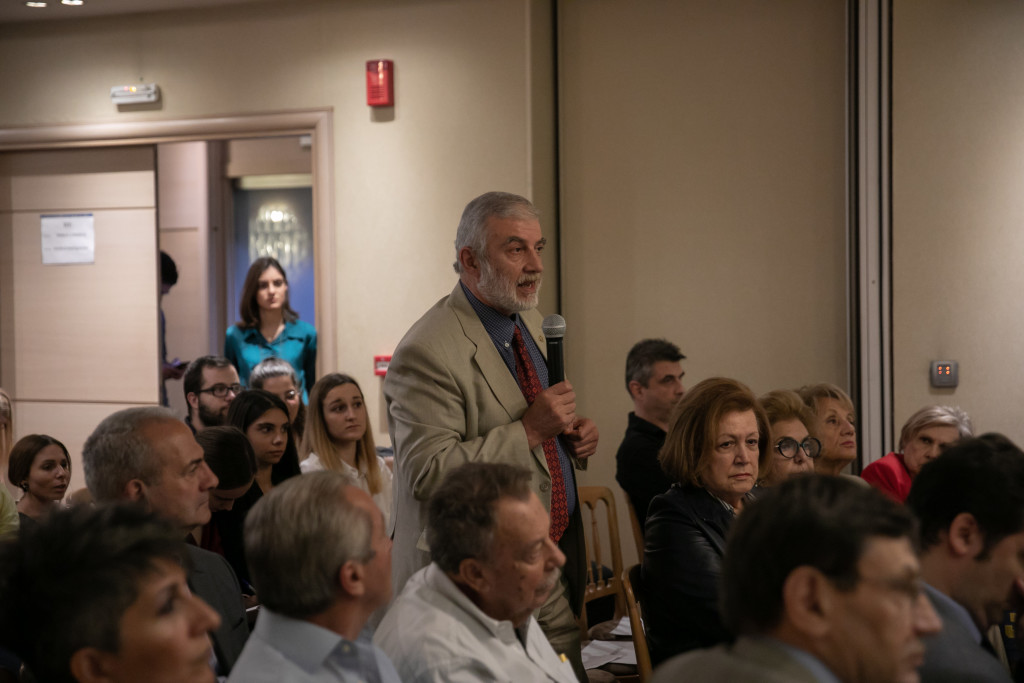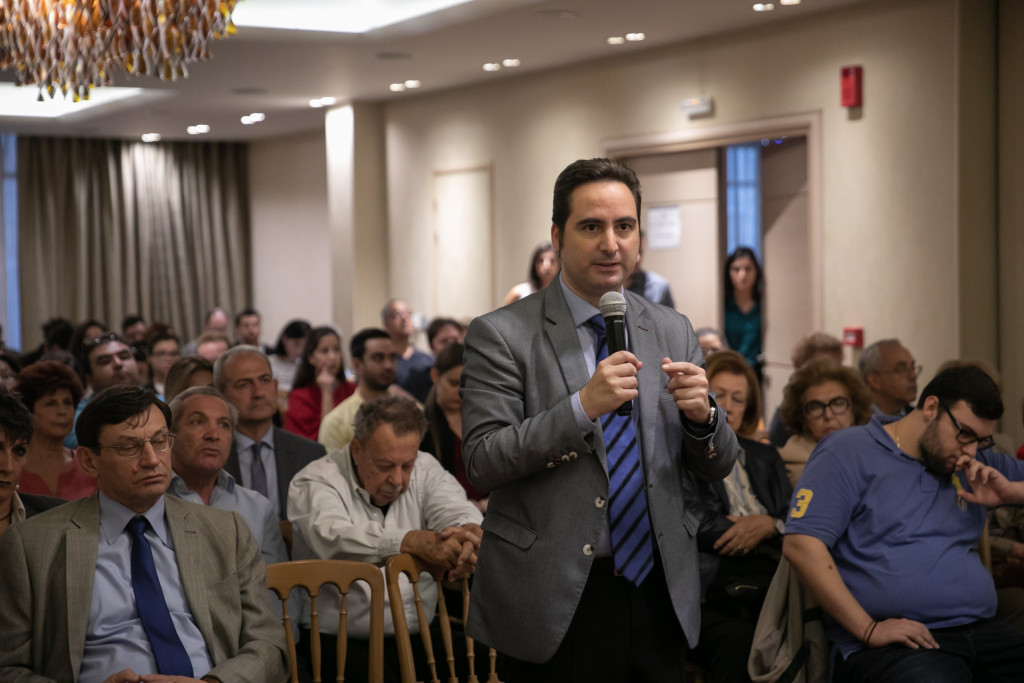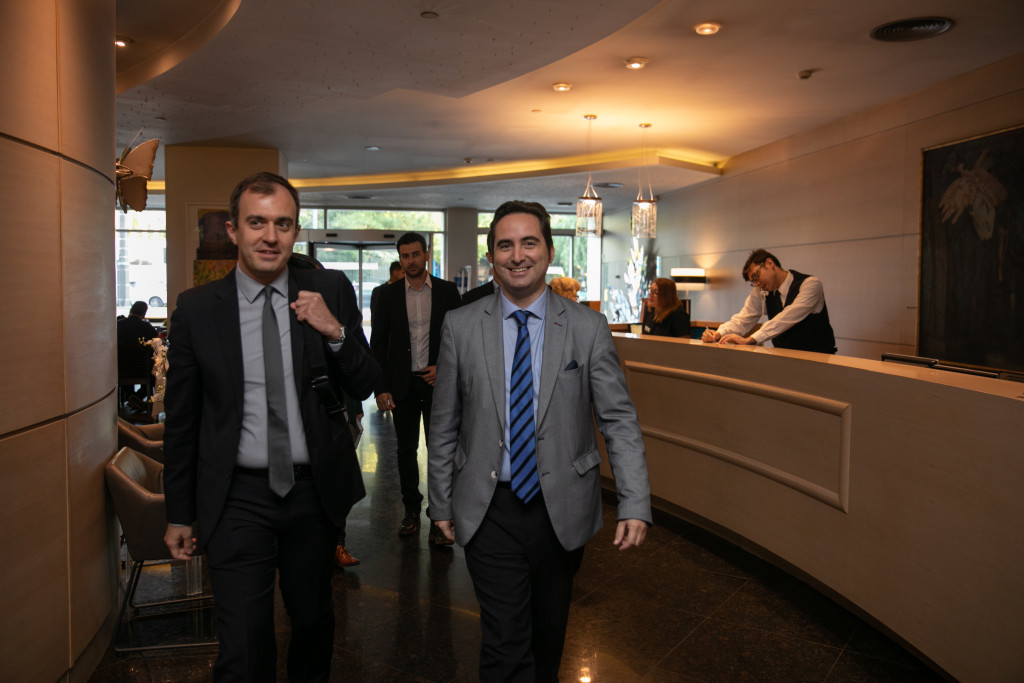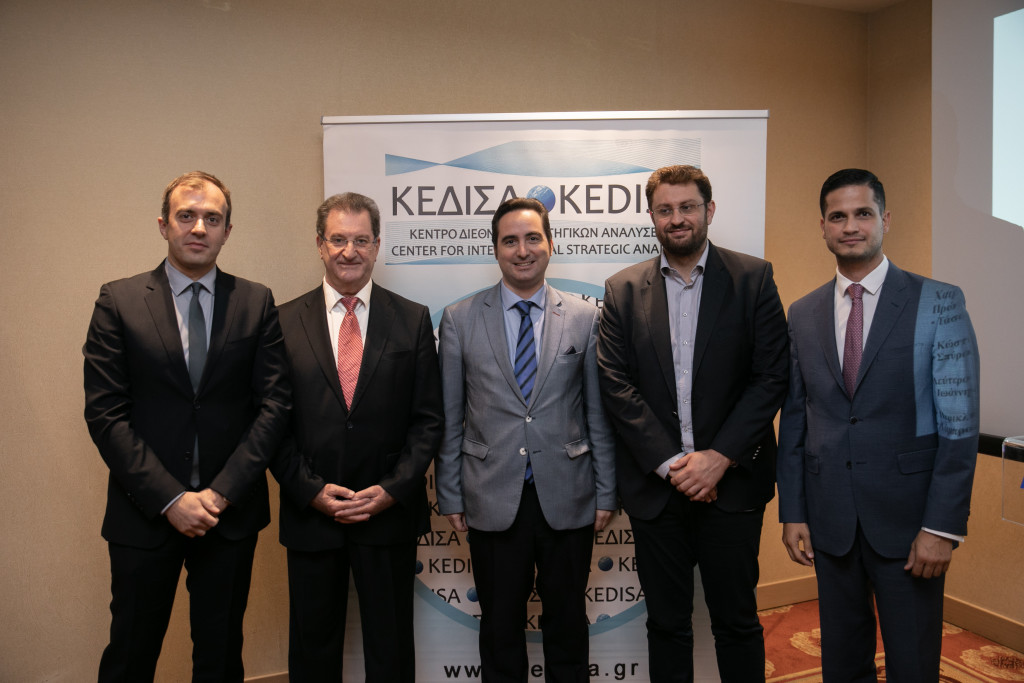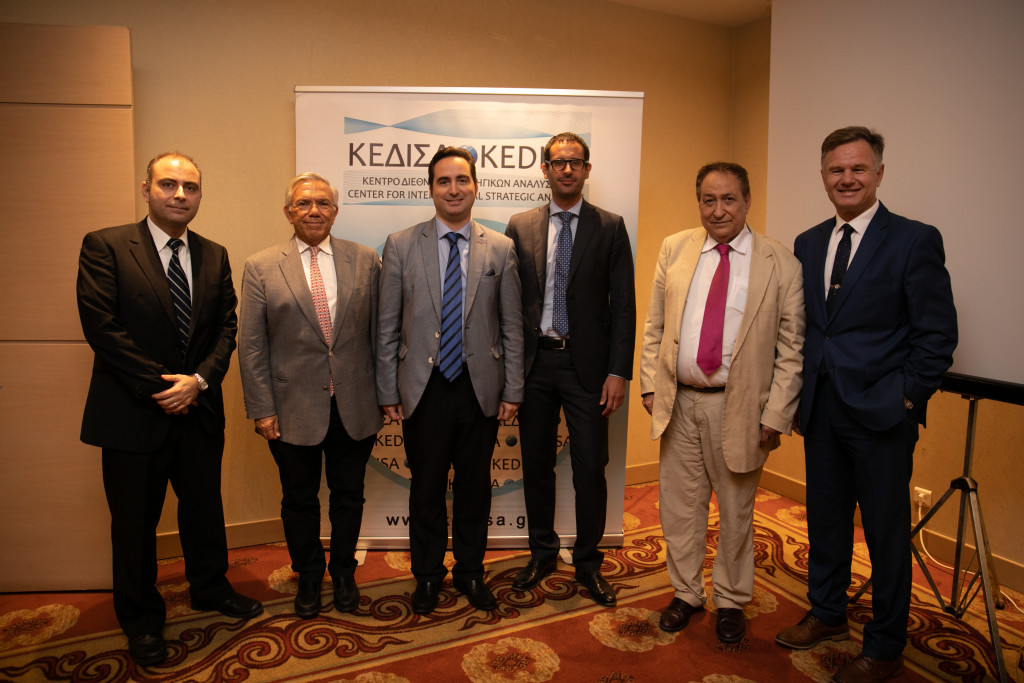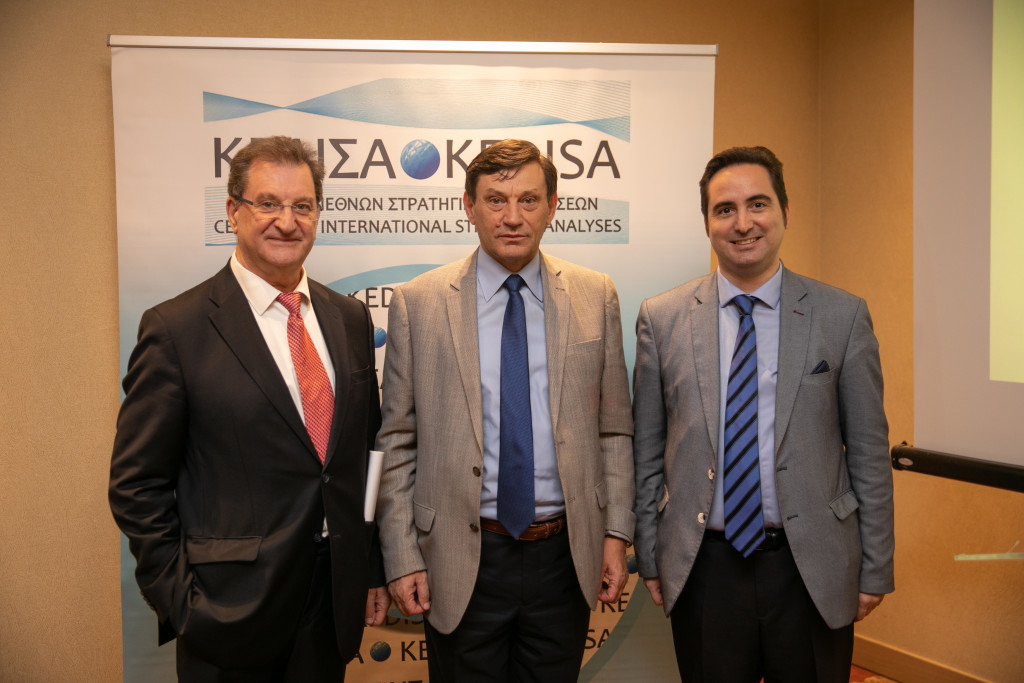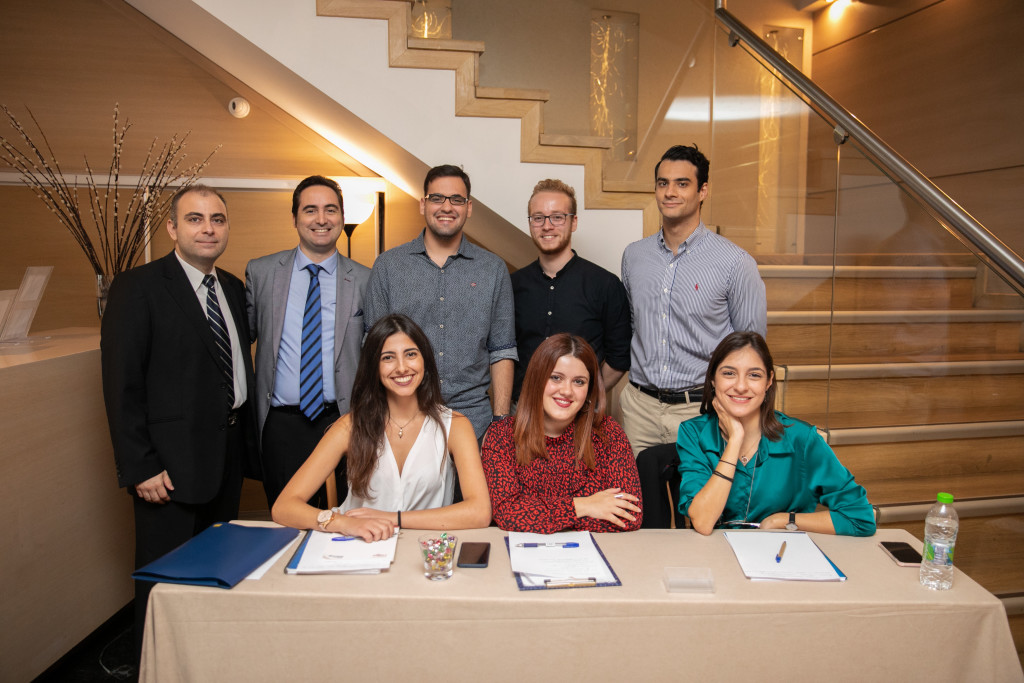The Center for International Strategic Analyses (KEDISA) held with great success an event titled “Cyprus Dispute: Challenges & Prospects” on October 21st, 2019. The event took place at Amalia Athens Hotel.
The coordinator of the first panel of the event was journalist and author Mr. Costas Mardas. The speakers of the first panel were: Mr. Tasos Chatzivasileiou (New Democracy MP of Serres Constituency and Secretary of the Standing Committee on National Defence and Foreign Affairs of the Greek Parliament), Mr. Costas Zachariades (SYRIZA MP for the Second Constituency of Athens) and Mr. Spyros Karanikolas (Deputy Spokesperson for PASOK).
The coordinator of the second panel of the event was journalist Mr. George Skafidas. The speakers of the second panel were: Mr. Ioannis Valinakis (former Vice-Minister of Foreign Affairs, Professor of International Relations & President of the Jean Monnet European Centre of Excellence of the University of Athens), Mr. Pericles Nearchou (Ambassador ret.) and Mr. Lambros Tzoumis (Lt. General ret. and former Representative of Greece to NATO).
The event was graced with the presence of many people such as former generals and admirals, ambassadors, members of the Greek diplomatic corps, the Armed Forces and the Security Corps, journalists and students. The presence of the former Honourable Chief of the Hellenic Army General Staff-General ret. Mr. Constantinos Gkinis, Admiral ret. Mr. Angelos Chrisikopoulos, the Vice-Admiral ret. and President of HELISS Mr. Vasileios Martzoukos, Lt General ret.(HAF) Mr. Ioannis Anastasakis and Vice-Admiral ret. Mr. Dimitris Papayannidis was a great honour for KEDISA.
In his introductory speech, Founder and President of KEDISA Mr. Andreas G. Banoutsos stated that 2019 is a landmark year for Cyprus due to the 60th anniversary of the signing of the London-Zurich agreements which led to the establishment of the Republic of Cyprus and the 45 years since Operation Attila (The Turkish invasion of the island of Cyprus). He then mentioned that the international community has repeatedly condemned the aforementioned invasion, demanding the withdrawal of Turkish occupation forces through a multitude of Decisions and Resolutions in international fora, such as the UNGA and the UNSC, the European Parliament, the Council of Europe, the Non-Aligned Movement and the Commonwealth. He also noted that the decisions of the United Nations shall determine the basis of a concerted solution, which, given the status of Cyprus as a Member State of the EU, should be fully compatible with the European legal framework and ensure continuity of effective participation of Cyprus in the EU decision-making processes. He also highlighted that the exercise of the sovereign rights of the Republic of Cyprus on its Exclusive Economic Zone (EEZ) is not associated with the process of resolving the Cyprus dispute in any way. To summarise, he stressed that the complete withdrawal of Turkish occupation forces and the abolition of the anachronistic system of guarantees are an integral part of a concerted, sustainable, fair and comprehensive solution to the Cyprus problem. He also went a step further by expressing that the full demilitarisation of the island and the presence of UN Peacekeepers (UNFICYP) under mandate and guarantee of the UNSC are a prerequisite for a sustainable and fair conflict resolution.
New Democracy MP of Serres Constituency and Secretary of the Standing Committee on National Defence and Foreign Affairs of the Greek Parliament Mr. Tasos Chatzivasileiou referred to Turkey’s revising role in the wider region under the leadership of Recep Tayyip Erdogan. He also pointed out that Greece should demand that the EU and its Western partners should impose sanctions on Turkey whenever it violates the rules of international law. In addition, he noted that perhaps the current situation is not optimal for achieving a sustainable and fair solution to the Cyprus conflict, while he stated that the standing position of Greece is that negotiations for resolving the Cyprus conflict should be carried out within the framework of the UN. Finally, he claimed that the Greek government wishes and seeks the renewal of the mandate of the UN Peacekeeping Force (UNFICYP) in Cyprus, despite the reactions of US policy circles.
SYRIZA MP for the second constituency of Athens Mr. Costas Zachariades emphasized that the resolution of the Cyprus conflict should include four main pillars: (a) complete demilitarisation of the island, (b) exercise of diplomatic and political pressure on Turkey, (c) strengthening of the cooperation between the Greek and Greek-Cypriot leadership, (d) respect for the rights of both communities on the island. Furthermore, he welcomed the fact that there is a consensus between the political parties in Greece, as far as the Cyprus issue is concerned, and estimated that the current situation is not the most favourable for the resolution of the Cyprus problem, although he noted that the passing of time and inaction do not help in achieving a solution.
Deputy spokesperson for PASOK Mr. Spyros Karanikolas pointed out that Cyprus is perhaps the most militarized region in the world. He condemned the illegal settlements and the destruction of the cultural heritage of the Turkish-occupied part of the island, while he also underlined that the integration of the Republic of Cyprus to the EU in 2004 has been a great success of the Greek foreign policy. He also remarked that this was the result of the initiative of the then PASOK government to separate the accession of the Republic of Cyprus in the EU from the resolution of political dispute. Finally, he stressed that there should be full demilitarisation of Cyprus and abolition of the anachronistic regime of guarantees, while criticising the “lukewarm” condemnation of the illegal Turkish actions in Cyprus’ EEZ by the EU, stressing that Cyprus’ EEZ should also be regarded as European EEZ.
The coordinator of the first panel Mr. Costas Mardas made some comments and expressed some concerns before giving the floor to the audience of the event. He stated that the trilateral cooperation between Greece, Cyprus and Israel is actually non-existent. He noted that the EU only recently mentioned Cypriot EEZ (not too long ago, they used the ambiguous term “Cypriot waters”). In addition, he pointed out that the bill of the American senator Menendez includes an amendment stipulating that, in order for the US sanctions against Turkey to be applied, the Republic of Cyprus should impose an embargo on the supply of Russian ships in its ports, while the US do not recognize the Cyprus EEZ (they speak of a “claimed EEZ” ). He also wondered if Greek Cypriots, driven by an overoptimistic estimation of their energy resources, might ultimately be harmed and if after all the maintenance of the current situation in Cyprus is ultimately more favourable to the Greek interests than the adoption of a resolution plan like that of former UN Secretary General Kofi Annan.
A very interesting discussion among the audience of the event and the speakers soon followed, in which the three distinguished speakers agreed between them and pointed out, inter alia, that a prerequisite for resolving the Cyprus conflict is the complete demilitarisation of the island, the forging of an agreement on the basis of a bi-zonal and bi-communal federation, the respect for the rights of the Greek Cypriots and the Turkish Cypriots and the renewal of the mandate of the UN Peacekeeping Force (UNFICYP) on the island.
At the outcome of the discussion of the first panel came the speeches of the speakers of the second panel.
The former Vice-Minister of Foreign Affairs Mr. Ioannis Valinakis mentioned in his speech that Turkey would neither consent to the withdrawal of the occupation forces from Cyprus nor accept the abolition of the system of guarantees. He also noted that Ankara is not really in favor of the international recognition of the pseudo-state of Northern Cyprus, the so-called Turkish Republic of Northern Cyprus (TRNC), but is seeking the indirect control of Southern Cyprus through achievement of an agreement either on the basis of a confederation or a federation, which would give the Turkish Cypriot community increased powers and a say in the governance of the island. On that account, Ankara aims to cancel the energy programme of the Republic of Cyprus through its provocative and illegal actions in the Cyprus EEZ. Then, Mr Valinakis pointed out that the international community encourages the Turkish unaccountability by showing tolerance. Neither the USA nor any other international “player” would use military force against Turkey and no one in Greece should have that illusion. The EU, for its part, has limited capabilities to prevent Turkey’s revisionism, which is why we must be prepared that Turkey will not hesitate to use military force, as it has already done in Syria. In conclusion, he stressed that Greece should draw up a comprehensive national strategy to confront Turkey’s expansionism.
Former ambassador Mr. Pericles Nearchou pinpointed that the Republic of Cyprus has made a lot of concessions towards Turkey and Turkish Cypriots by accepting political equality between the two communities, while the Turkish Cypriots make up for only 18% of the total population of the island. He also expressed the view that it is preferable for the status quo to stay as it is than for the Republic of Cyprus to accept a solution that will force it to have the Turkish side as a partner on the southern part of the island. He also emphasised that the vision dictating that the Republic of Cyprus should not have efficient military capabilities so that it does not taunt Turkey and the Turkish Cypriots is unjustified and detrimental, especially since the northern part of the island is illegally occupied by Turkish troops. He also underlined that the Republic of Cyprus has many advantages (natural resources, EU membership, strong economy) and should not give in to the absurd demands of the Turkish Cypriots and Ankara. In closing, Mr. Nearchou said that Greece and the Republic of Cyprus should strengthen their defense capabilities, considering that the Greek-Turkish military balance has been steadily deteriorating since the 1990s.
Lt General ret. Mr. Lambros Tzoumis gave an interesting historical overview from 1878, where Cyprus was granted, in the form of a lease, from the Ottoman Empire to Great Britain, until today. He pointed out that Turkey’s objective was to maintain its control over Cyprus and to co-exploit its energy resources, while also seeking to legitimise its unlawful actions by devising legal tricks (i.e. the opinion that islands do not have a continental shelf). He added that Greece is on a collision course with Turkey up to 2023 and pointed out that the only way to deal with the Turkish imperialism is the strengthening of the defence expenditure of the country and the formation of a strategic culture, which, inter alias, should implant the belief that one must be ready for sacrifices if he wants to ensure national independence and territorial integrity.
This was followed by a very intense and interesting discussion between the speakers and the audience of the event, where the distinguished speakers agreed that it is absolutely necessary to upgrade the defence capabilities of Greece in the wake of Turkish expansionism and the reverse of the constantly deteriorating (at the expense of Greece) balance of military power between the two countries. Giving a more positive note, the Lt General ret. Mr. Lambros Tzoumis noted that, even under adverse circumstances, the Greek Armed Forces maintain a high quality of defense capabilities. Proof of this is that Turkey has not ventured to come into conflict with our country.
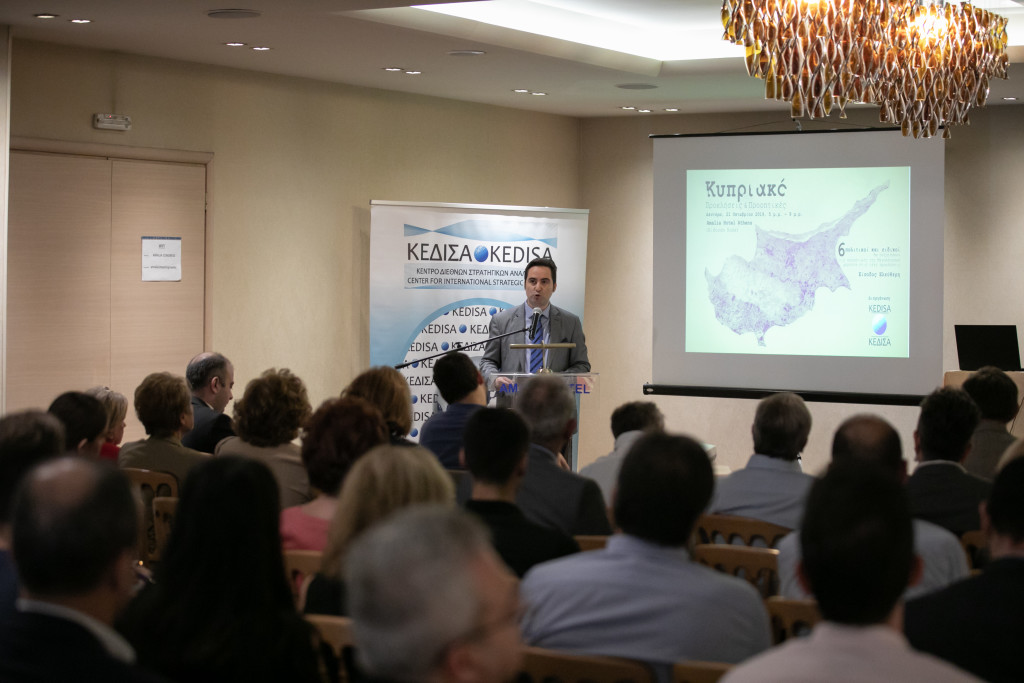
Founder & President of KEDISA Mr. Andreas G. Banoutsos at the event.
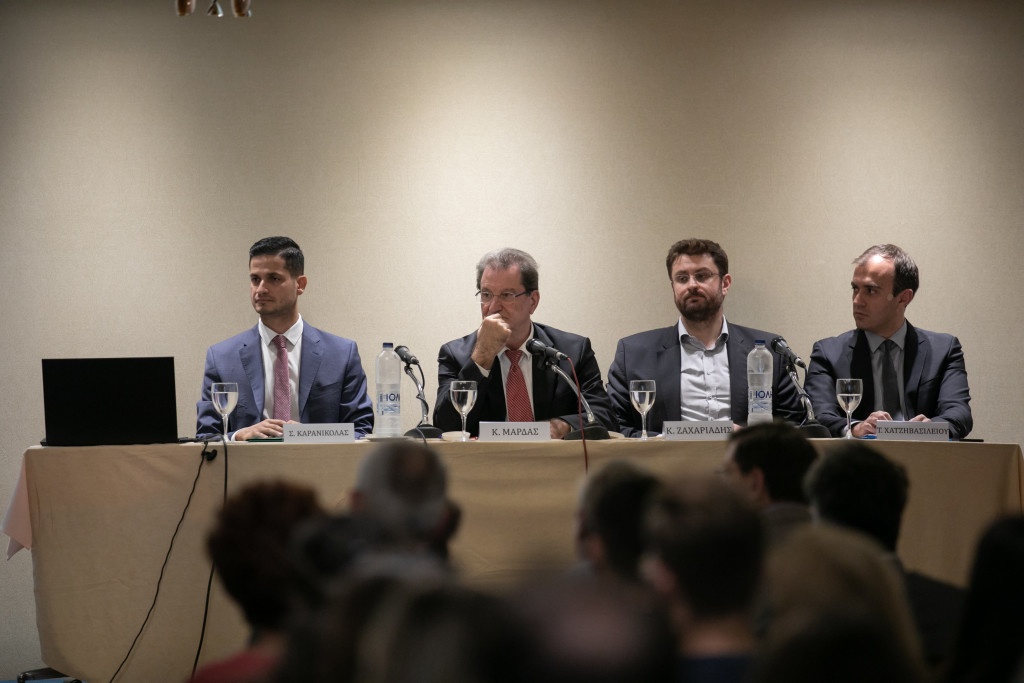
 English
English
